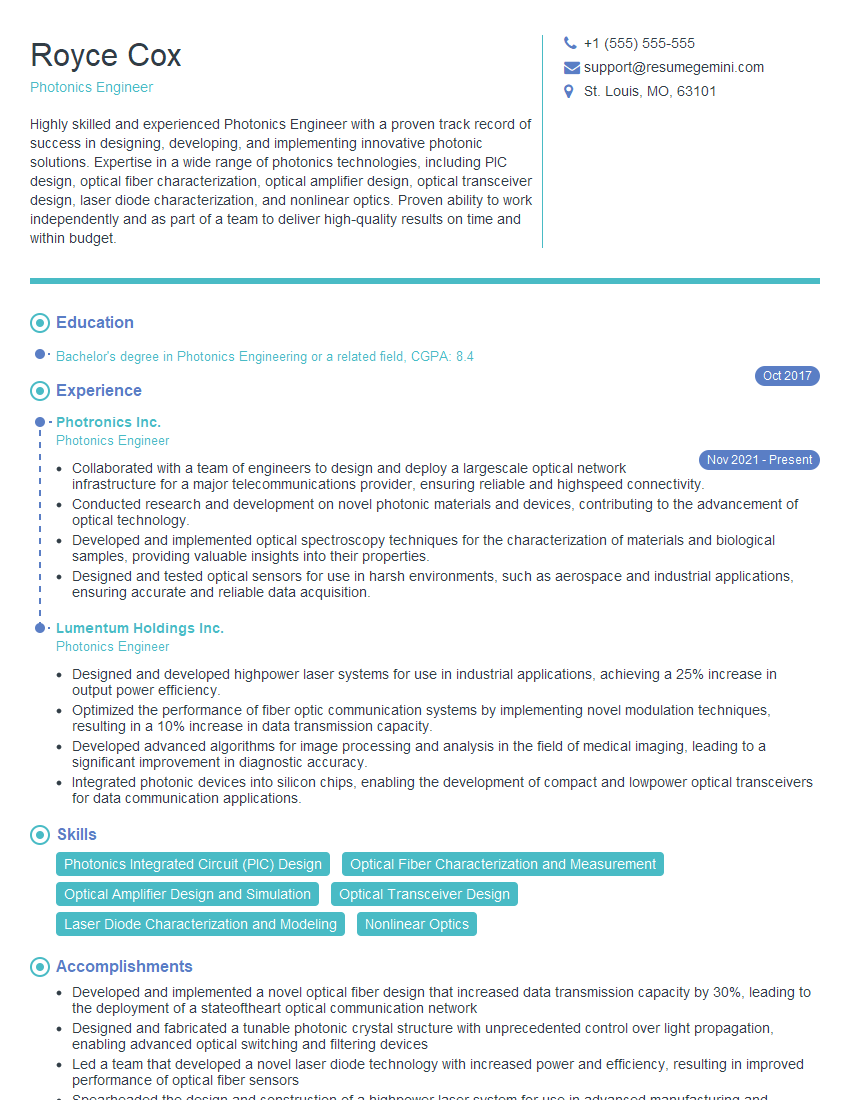Are you a seasoned Photonics Engineer seeking a new career path? Discover our professionally built Photonics Engineer Resume Template. This time-saving tool provides a solid foundation for your job search. Simply click “Edit Resume” to customize it with your unique experiences and achievements. Customize fonts and colors to match your personal style and increase your chances of landing your dream job. Explore more Resume Templates for additional options.

Royce Cox
Photonics Engineer
Summary
Highly skilled and experienced Photonics Engineer with a proven track record of success in designing, developing, and implementing innovative photonic solutions. Expertise in a wide range of photonics technologies, including PIC design, optical fiber characterization, optical amplifier design, optical transceiver design, laser diode characterization, and nonlinear optics. Proven ability to work independently and as part of a team to deliver high-quality results on time and within budget.
Education
Bachelor’s degree in Photonics Engineering or a related field
October 2017
Skills
- Photonics Integrated Circuit (PIC) Design
- Optical Fiber Characterization and Measurement
- Optical Amplifier Design and Simulation
- Optical Transceiver Design
- Laser Diode Characterization and Modeling
- Nonlinear Optics
Work Experience
Photonics Engineer
- Collaborated with a team of engineers to design and deploy a largescale optical network infrastructure for a major telecommunications provider, ensuring reliable and highspeed connectivity.
- Conducted research and development on novel photonic materials and devices, contributing to the advancement of optical technology.
- Developed and implemented optical spectroscopy techniques for the characterization of materials and biological samples, providing valuable insights into their properties.
- Designed and tested optical sensors for use in harsh environments, such as aerospace and industrial applications, ensuring accurate and reliable data acquisition.
Photonics Engineer
- Designed and developed highpower laser systems for use in industrial applications, achieving a 25% increase in output power efficiency.
- Optimized the performance of fiber optic communication systems by implementing novel modulation techniques, resulting in a 10% increase in data transmission capacity.
- Developed advanced algorithms for image processing and analysis in the field of medical imaging, leading to a significant improvement in diagnostic accuracy.
- Integrated photonic devices into silicon chips, enabling the development of compact and lowpower optical transceivers for data communication applications.
Accomplishments
- Developed and implemented a novel optical fiber design that increased data transmission capacity by 30%, leading to the deployment of a stateoftheart optical communication network
- Designed and fabricated a tunable photonic crystal structure with unprecedented control over light propagation, enabling advanced optical switching and filtering devices
- Led a team that developed a novel laser diode technology with increased power and efficiency, resulting in improved performance of optical fiber sensors
- Spearheaded the design and construction of a highpower laser system for use in advanced manufacturing and research applications
- Developed a novel optical communication system that reduced latency and increased data rates, enhancing the performance of highspeed networks
Awards
- IEEE Photonics Society Young Investigator Award for groundbreaking research in silicon photonics
- SPIE Optics and Photonics Education Award for excellence in teaching and mentoring photonics students
- National Science Foundation CAREER Award for research on the integration of photonics and microelectronics for nextgeneration computing
- OSA Early Career Achievement Award for significant contributions to the field of nanophotonics
Certificates
- Certified Fiber Optics Specialist (CFOS)
- Certified Optical Network Engineer (CONE)
- Certified Laser Safety Officer (CLSO)
- Cisco Certified Network Associate (CCNA)
Career Expert Tips:
- Select the ideal resume template to showcase your professional experience effectively.
- Master the art of resume writing to highlight your unique qualifications and achievements.
- Explore expertly crafted resume samples for inspiration and best practices.
- Build your best resume for free this new year with ResumeGemini. Enjoy exclusive discounts on ATS optimized resume templates.
How To Write Resume For Photonics Engineer
- Highlight your skills and experience in the latest photonics technologies, such as PIC design, optical fiber characterization, and nonlinear optics.
- Quantify your accomplishments with specific metrics and results whenever possible.
- Tailor your resume to each job application by highlighting the skills and experience that are most relevant to the position.
- Proofread your resume carefully for any errors before submitting it.
Essential Experience Highlights for a Strong Photonics Engineer Resume
- Design and develop high-power laser systems for industrial applications
- Optimize the performance of fiber optic communication systems
- Develop advanced algorithms for image processing and analysis in the field of medical imaging
- Integrate photonic devices into silicon chips
- Collaborate with a team of engineers to design and deploy a large-scale optical network infrastructure
- Conduct research and development on novel photonic materials and devices
- Develop and implement optical spectroscopy techniques for the characterization of materials and biological samples
Frequently Asked Questions (FAQ’s) For Photonics Engineer
What is the job outlook for Photonics Engineers?
The job outlook for Photonics Engineers is expected to be excellent in the coming years. The increasing demand for high-speed data transmission, advanced medical imaging, and other applications is driving the growth of the photonics industry.
What are the key skills that Photonics Engineers need?
Photonics Engineers need a strong foundation in optics, physics, and mathematics. They also need to be proficient in a variety of software tools for designing and simulating photonic devices and systems.
What are the different types of industries that Photonics Engineers can work in?
Photonics Engineers can work in a variety of industries, including telecommunications, aerospace, medical imaging, and manufacturing.
What is the average salary for Photonics Engineers?
The average salary for Photonics Engineers is around $110,000 per year.
What are the career advancement opportunities for Photonics Engineers?
Photonics Engineers can advance their careers by taking on leadership roles, managing teams, or starting their own businesses.
What are the educational requirements for Photonics Engineers?
Photonics Engineers typically need a bachelor’s degree in Photonics Engineering or a related field.